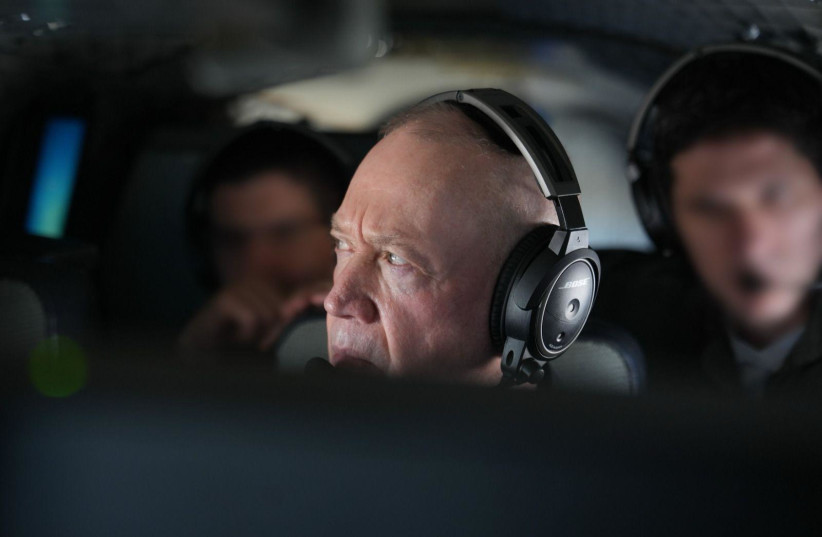Israel has “utterly” rejected Hamas’s demand that the IDF end its military campaign in Gaza in exchange for the release of the remaining hostages in Gaza, Prime Minister Benjamin Netanyahu said on Sunday night.
“To date we have returned home 110 of the hostages,” Netanyahu said, emphasizing that Israel is “committed to returning all of them.
“This is one of the goals of the war and the military pressure is a necessary condition to achieving it,” Netanyahu stated.
“I utterly reject the Hamas monsters’ capitulation terms,” Netanyahu said. He explained that the terrorist group has demanded an end to the war, a complete IDF withdrawal from Gaza, the retention of its control of Gaza, and the release of the participants in the October 7 attack against Israel.
In that attack over 1,200 people were massacred and another 250 were taken hostage.

'Gaza will no longer pose a threat to Israel'
“Were we to agree to this – our soldiers would have fallen in vain,” Netanyahu declared. “Were we to agree to this – we would not be able to ensure the security of our citizens.
“We would be unable to safely restore the evacuees to their homes and the next October 7 would be only a question of time.
“I am not prepared to accept such a mortal blow to the security of Israel; therefore, we will not agree to this,” Netanyahu said.
He spoke following the publication of a Wall Street Journal report of a renewed US drive together with mediating countries Egypt and Qatar to secure a hostage deal for the remaining 132 people held in Gaza, including a one-year-old baby.
According to The Wall Street Journal, a three-phase deal was on the table covering 90 days, in which Israeli civilians would be freed in exchange for the release of Palestinian terrorists jailed by Israel.
Israel would also have to withdraw the IDF from Gaza’s towns and cities, restore freedom of movement in the enclave, end drone surveillance, and double the amount of goods entering the Strip.
The second would involve the release of additional Palestinian prisoners in exchange for female IDF soldiers, plus the bodies of dead hostages.
During the third phase, Hamas would free male soldiers plus Israeli men of combat age, as Israel pulls some of its forces out of Gaza.
There would also be talks for a permanent cease-fire, an Israel-Saudi normalization deal, and a two-state resolution to the conflict.
Netanyahu on Sunday repeated his opposition, clearly stated already on Thursday, for the creation of a Palestinian state.
On Sunday, Netanyahu stressed that he had explained this to US President Joe Biden when they spoke on Friday morning.
“I emphasized to President Biden our determination to achieve all the goals of the war, and to ensure that Gaza never again constitutes a threat to Israel,” he said.
“That is why I insist that, after we achieve complete victory, after we eliminate Hamas,” there will not be groups in Gaza that finance, educate, or dispatch terrorists.
Eisenkot: the likelihood of a military hostage rescue is extremely low
“Gaza must be demilitarized, under Israel’s full security control,” he declared, “I will not compromise on full Israeli security control over all the territory west of the Jordan River.”
He stressed that he has defended this position in the face of great international and domestic pressure.
“My insistence is what has prevented – over the years – the establishment of a Palestinian state that would have constituted an existential danger to Israel,” Netanyahu said. “As long as I am prime minister, I will continue to strongly insist on this.”
Netanyahu challenged Israeli politicians, that “if someone has a different position, they should show leadership and candidly state their position to the citizens of Israel.”
Israel under his leadership, Netanyahu said, will continue “the war on all fronts and in all sectors. We are not giving immunity to any terrorist: not in Gaza, not in Lebanon, not in Syria, and not anywhere. Whoever tries to harm us, we will harm him.”
Netanyahu spoke amid growing speculation that the war’s goals may not be attainable, particularly given reports that Hamas’s fighting forces and store of arms have not suffered a fatal blow, and as such the war could continue for many months.
The prime minister is under pressure both from his international allies and portions of the Israeli public, including the relatives of the hostages, to make a deal on the presumption that this is the only way to ensure that the captives return alive.
Minister Gadi Eisenkot (National Unity), who is a former IDF chief of staff and lost his son in the Hamas war, said that the hostages can only be returned through a deal.
In an interview with the Channel 12 program “Uvda” over the weekend, he was asked whether the hostages could be released in a rescue mission similar to the 1976 IDF operation that freed around 100 hostages in Entebbe, Uganda.
“The hostages are scattered in such a way – even underground – that the likelihood [of such an operation] is extremely low,” Eisenkot said.
“We are still making efforts and looking for every opportunity, but the likelihood is low and to say that this is how it will happen is to sow an illusion.”
Reuters contributed to this report.
